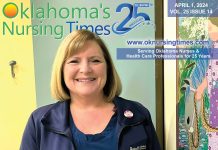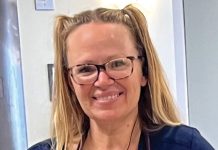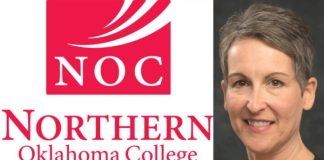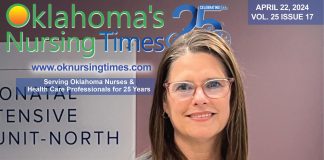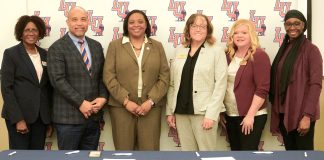
OU College of Nursing Faculty Member to Advise Federal Agency on Health System Resilience
ARPA-H Focuses on High-Risk, High-Potential Research
Leremy Colf, Ph.D., an associate professor in the Fran and Earl Ziegler College of Nursing at the University of Oklahoma Health Sciences, has been named a senior adviser to the newest agency in the federal government, the Advanced Research Projects Agency for Health, or ARPA-H. He will focus on health system resilience, a concept of critical importance as the world faces crises like climate change and emerging infectious diseases.
ARPA-H, which was launched in March 2022, is innovative among government agencies. It is modeled after DARPA, the Defense Advanced Research Projects Agency, which invests in projects with the potential for transformative change rather than incremental advances. Notably, DARPA invented the network that gave birth to the internet. ARPA-H takes the same approach by investing in health research projects that face a high risk of failure but will be life-changing if they succeed.
Colf will serve in the ARPA-H Office of the Director. The role is designed to bring in outside expertise for short periods of time, working with agency personnel and researchers to think big and tackle pioneering projects.
“This is a great opportunity to help ARPA-H in its mission of revolutionizing health care systems,” he said. “I think it says a lot about the status of OU Health Sciences that the federal government would reach out to us. It also provides me with opportunities to talk to our students about the future of health care. We aren’t just educating future nurses; we’re educating future leaders of the health care system and empowering them to create the future they want to see.”
The advisory role leverages Colf’s education and noteworthy career experiences in both government and academia. After earning a doctorate in microbiology and immunology, he completed a post-doctoral fellowship and a fellowship with the U.S. Department of Homeland Security, where he worked in bioterrorism defense. He had been there only two weeks when the first case of the Ebola virus arrived in the United States. Because of his virology background, he coordinated efforts with laboratories around worldwide to inform the operational response to Ebola, and he served as a science and technology adviser to the White House Ebola Task Force.
When his fellowship ended, he began working at the U.S. Department of Health and Human Services to improve disaster response. That role coincided with the arrival of COVID-19, which concentrated his efforts on deploying federal medical teams and helping hospitals as they struggled under the stresses of the pandemic response.
For nearly two years, he has been a faculty member at the OU College of Nursing, where he conducts research, teaches doctoral students and engages them in research experiences. He holds the Donna L. Wong Professorship in Pediatric Nursing at the college. He also serves as a senior adviser and research liaison to OU Health, the clinical partner of OU Health Sciences, bridging the college and the health enterprise on research projects.
His distinctive expertise makes him ideal for advising ARPA-H on the resiliency of health systems, particularly in climate disasters. Recent history has demonstrated the concerns: In 2017, Hurricanes Harvey, Irma and Maria devastated large areas of the Caribbean, Florida, Georgia, South Carolina and Texas. In 2020, Lake Charles, Louisiana, was hit by two hurricanes six weeks apart. Numerous hospitals shut down, and when people evacuated and sought care elsewhere, they often didn’t have their prescriptions and medical histories, nor did hospitals have access to them.
“Health resilience is about determining how we can have continuity of care, how we can identify the populations who need the most care – addressing these major concerns before we even know what the next disaster will be,” Colf said. “What are the creative ways of addressing these issues and making hospitals and health systems more resilient?”
Colf said his experience as an ARPA-H adviser will only enhance his ongoing interactions with students at the OU College of Nursing. Although he is not a nurse, his career in both government and academia illustrates that health careers don’t always look like they did in the past.
“Historically, people with science and health professional degrees went into a laboratory, worked in industry, or provided patient care in a hospital,” he said. “Today, the options have expanded dramatically. We need people in health policy roles who have scientific expertise and health care skills in order to shape those roles appropriately. It is wonderful to expose our students to all of these options and to discuss their future opportunities.”
OU College of Nursing Dean Julie Hoff, Ph.D., MPH, RN, agreed that Colf’s advisory role with ARPA-H will benefit both the college and health care more broadly.
“This opportunity is a shining example of the caliber of our faculty in the OU College of Nursing,” Hoff said. “We are excited for what Dr. Colf will do to revolutionize health care systems, working in collaboration with ARPA-H and talented researchers across the nation. We are also excited to share his experiences with our students. Not only do we provide our students with a solid education and high-quality clinical experiences, but we also connect them with opportunities to learn about health policy and global affairs.”
Founded in 1890, the University of Oklahoma is a public research university located in Norman, Oklahoma. As the state’s flagship university, OU serves the educational, cultural, economic and health care needs of the state, region and nation. OU was named the state’s highest-ranking university in U.S. News & World Report’s most recent Best Colleges list. For more information about the university, visit https://www.ou.edu/.



